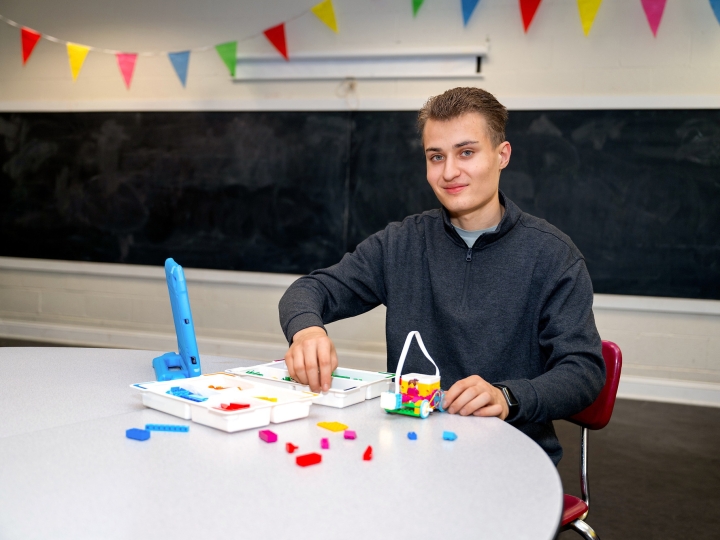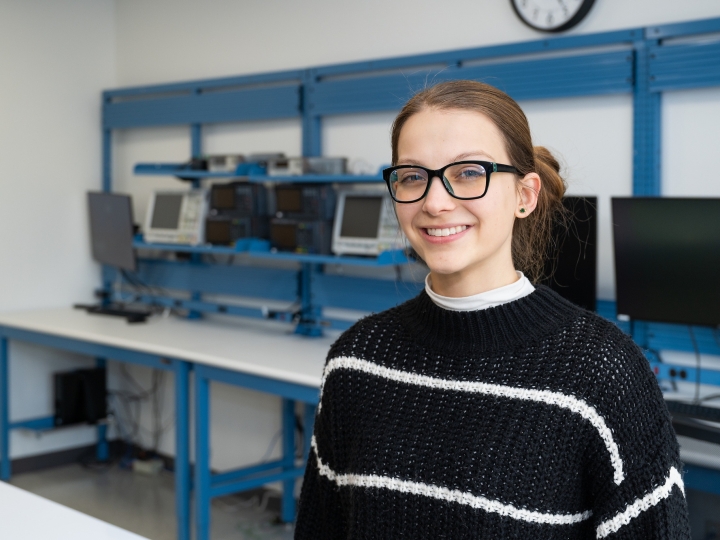
David Berry ’24, Computer Engineering
September 15, 2021
David Berry '24, a computer engineering major from Tunkhannock, Pa., stands with his musical Tesla coil — a device that turns electrical sparks into music. Photo by Emily Paine, Communications
Bucknell's makerspaces allow me to learn at my own pace. They provide me with resources to learn on my own as well as ask questions if I get stuck.
In the late 2000s, while other kids his age were perfecting their bowling game on the Nintendo Wii, David Berry '24 was taking apart calculators, printers and clocks to see how they worked.
Berry's curiosity about what was happening under these gadgets' plastic shells started at age 7. That's when he found his dad's old 200-in-one electronic lab kit — a device that promised "hours of educational fun for the whole family!" As advertised, Berry spent hours experimenting with resistors, transistors and transformers. He learned that by arranging the wiring just so, he could create useful tools like a timer, radio or burglar alarm.
"From there, my interest in electronics only grew," Berry says.
Some of Berry's skills were acquired through that most popular scientific method: trial and error. Others required a visit to YouTube.
By middle school, he had graduated to disassembling larger appliances like microwaves, treadmills and old TVs to poach parts he could use on other projects. In high school, he used found parts to build a six-fan Hovercraft, joined the robotics team and operated a side business repairing his friends' laptops, Roombas and Keurigs.
"I've taken every stride I could to advance my knowledge of electronics both inside and outside of school," he says.
As Berry's technological talents grew, so did his need for more sophisticated equipment and education. That's what led this computer engineering major from Tunkhannock, Pa., to choose Bucknell University.
He wanted a school that offered everything — the complete circuit consisting of experienced professors, high-tech tools and peers who shared his passions.
"I chose Bucknell because of its prestigious and expansive electronics and computing programs — as well as its vast makerspaces," Berry says. "The equipment has allowed me to produce higher-quality parts and use newer technologies, such as laser cutters and 3D printers."
Berry's self-taught skills and Bucknell's world-renowned engineering program combine to give him near-limitless possibilities. When he graduates, he'll have turned a childhood hobby into a high-paying career.

By applying power to a Tesla coil, David Berry can play precomposed music from his laptop or an SD card. Photo by Emily Paine, Communications
Notes From a Tinkerer
Berry's interest in tinkering, first sparked by the diodes and circuits on his dad's 200-in-one electronic kit, hasn't gone away.
It's just been upgraded. Berry has graduated from taking apart devices built in a far-off factory to crafting his own creations.
For his latest project, he's building a musical Tesla coil — a device that turns electrical sparks into music. The instrument's official name is a double-resonant solid-state Tesla coil, but even that long name belies the amount of work it required to create.
"I had to sift through online forums — years of conversations between the hobbyists that pioneered and expanded the technology," Berry says. "If I had questions, these hobbyists were willing to help out — as long as I tried to figure it out myself beforehand."
Finding the materials to build the device was its own grand challenge. He purchased PVC pipes and an aluminum dryer vent duct from Lowe's, 50 feet of copper tubing from someone on eBay and a driver from a Tesla coil hobbyist in Singapore. The driver allows the device to play music by sending electrical pulses through the coil in time with songs controlled by Berry's laptop.
After hours of painstaking work, Berry has programmed his creation to play songs like "Shape of You" by Ed Sheeran, "Cooler Than Me" by Mike Posner and "Aerodynamic" by Daft Punk.
"When I play it for someone, they're a bit hesitant at first but quickly become infatuated with the unique sound and shocking display the coil produces," Berry says. "They often ask for an encore."
As for Berry's encore, he hopes to continue upgrading his Tesla coil as he upgrades his own skills through Bucknell's computer engineering program.
"As I learn more throughout my time as a computer engineer, I can revisit and remake parts of my Tesla coil," he says. "I love learning as much as I can about new topics that interest me."

